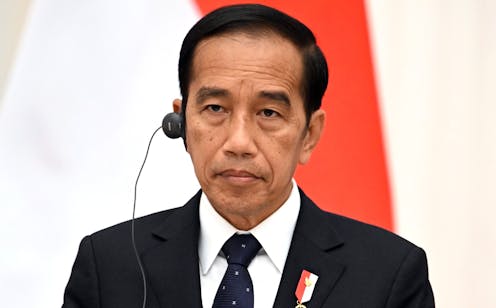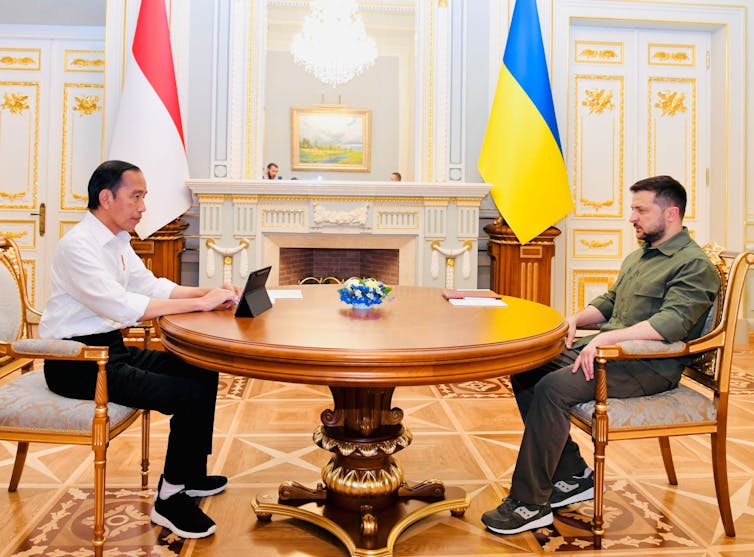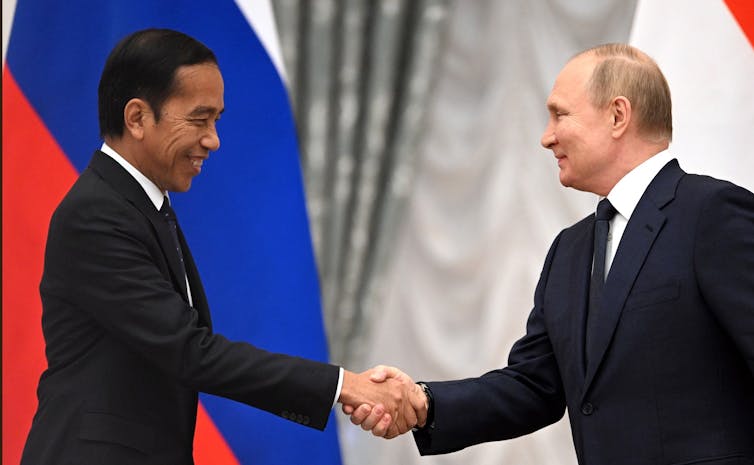
After the recent diplomatic visits of Indonesian President Joko “Jokowi” Widodo to Ukraine and Russia, some Indonesian politicians and public figures have suggested that the Indonesian leader should earn the Nobel Peace Prize for his efforts to facilitate dialogues between Russian President Vladimir Putin and Ukrainian President Volodymyr Zelenskyy, a feat many state leaders have attempted and failed.
Jokowi’s supporters believe he deserves it, as the first Asian leader to visit both Kyiv and Moscow since the war broke out in February.
But the meetings fell a long way short of securing peace. Just a day after Jokowi left Kyiv, Russian missiles attacked Serhiyivka in the southern Odesa region, killing 16. And just after Jokowi met Putin, Russia claimed total control of Lysychansk, a city in eastern Ukraine.
Since the beginning of Jokowi’s diplomatic mission, many experts have expressed doubts in Indonesia’s capability to be a peace broker and stop Putin’s invasion. It seems that Jokowi only pragmatically uses his visits to serve his own interest and gain domestic attention.
Forget about the world, it’s about domestic interest
The benefits of his shuttle diplomacy for the wider world are still vague, but its aims are closely aligned with Indonesia’s – and Jokowi’s – own interests.
First, Indonesia wants to secure its own wheat supplies from Russia and Ukraine.
As one of the largest importers of Ukrainian grain, Indonesia needs a stable supply of wheat to maintain the production of wheat-based food, particularly instant noodles.
And as a country with the world’s second-largest demand for instant noodles after mainland China, the rising prices of instant noodles in Indonesia could derail Jokowi’s domestic legitimacy.
Second, Indonesia needs to prove its capability in chairing the Group of 20 (G20) this year.
Jokowi, again, invited Putin and Zelenskyy to attend the G20 Leaders Summit in Bali this November, trying to show that Indonesia could accommodate the concerns of the West while still maintaining good relations with Russia.
The double-invitation fits the long-standing principles of Indonesia’s “free and active” foreign policy, which means to engage all parties while keeping balance, especially when dealing with great powers. This ambivalent, fence-sitting approach has been criticised by many as inadequate.
If Putin and Zelenskyy attend the summit, along with the presence of other Western leaders, Jokowi can gain momentum to build his foreign policy legacy.
Third, the visits are beneficial for Jokowi and his administration to attract approval from the domestic audience.
Many newspapers in Indonesia have praised Jokowi, saying he had made a courageous decision in attempting to promote peace – hence the calls for him to receive the Nobel Peace Prize.
Public on social media has expressed pride to Jokowi and called any critical scrutiny as “unpatriotic”.
Indonesian senior diplomat Dino Patti Djalal was bullied by social media users after expressing his caution and doubts over the visits.
The photos and videos released by the Presidential Secretariat Office are designed to target Indonesian audiences attempting to present Jokowi as a humanitarian who is sincerely interested in pursuing peace.
Therefore, it is hard to dispel the notion that Jokowi’s visits were geared towards Indonesian rather than global audiences.
A praiseworthy, yet doubtful mission
Indonesia may have experience in a mediating role in Southeast Asia, but not outside the region. And that has raised questions about whether Putin will listen to Jokowi’s plea for peace.
So far, at least, Jokowi’s mission to broker a ceasefire has been unsuccessful.
In Kyiv, there was no other significant result made by Jokowi and Zelenskyy, besides a visa-free agreement that will allow Indonesians to visit Ukraine, and vice versa, without visa for 30 days.

However, in a press conference after a private talk with Zelenskyy, Jokowi claimed he received a private message from the Ukrainian leader that he would deliver to Putin. Shortly afterward, Ukraine’s Press Secretary denied the claim, saying that if Zelenskyy had any messages to someone, he would deliver them in his daily public briefings.
By its nature, a secret message – particularly between state leaders – must remain a secret. Jokowi risked losing trust from the Ukrainians by commenting publicly.
There is no reason for Jokowi to say that unless he wants to bolster his credentials and be seen as a capable negotiator in front of the Indonesian people.
On the other hand, the Kremlin already claimed the message’s existence. This could burden Jokowi’s credibility as a potential peace broker and drive a wedge between Ukraine and Indonesia.
Experts in Ukraine argued that Jokowi’s primary mission was no more than to show up himself as an influential leader in global arena.
Zelenskyy’s official personal Twitter account, which he usually uses to publicly convey gratitude to many foreign leaders, failed to mention Jokowi’s visit. It reflects Ukraine’s wariness about Indonesia’s ambivalent position in this war.
The visit to Moscow, meanwhile, brought more beneficial results for Indonesia, which included a commitment to cooperation in nuclear energy and railway projects.
However, Putin apparently used Jokowi’s visit as his PR opportunity, citing the historical connection between the Soviet Union and Indonesia while also highlighting the recent visit of Russia’s Muslim delegation. The nostalgic view and the issue of religion are vital to garner more sympathy from the already pro-Russian society in Indonesia.
Even when Jokowi presented the food crisis issue to Putin, the latter defended Russia’s position, emphasising that the crisis was caused by the sanctions imposed by the West – a quite predictable response.
Jokowi’s assertion about Putin’s commitment to food security was inconsistent with Putin’s statement reiterating that Russia was ready to only supply agricultural products to friendly countries such as Indonesia.
So, it is difficult to see that the visits will have any short-term impacts on the war.

What’s next?
Jokowi has said several times that Indonesia has no other interest but peace between Russia and Ukraine. But without a continuation of peace efforts, such as appointing a special envoy to bridge the communication gap between Russia and Ukraine, it is difficult to see this visit achieving anything significant in terms of peace.
Jokowi’s domestic legacy is probably safe if the food prices stabilise, but his foreign policy legacy, especially if he wanted to be considered a global leader like his predecessor Sukarno, is still in doubt.
Radityo Dharmaputra is also a Junior Research Fellow and a doctoral student at the Johan Skytte Institute of Political Studies, University of Tartu, Estonia.
This article was originally published on The Conversation. Read the original article.







